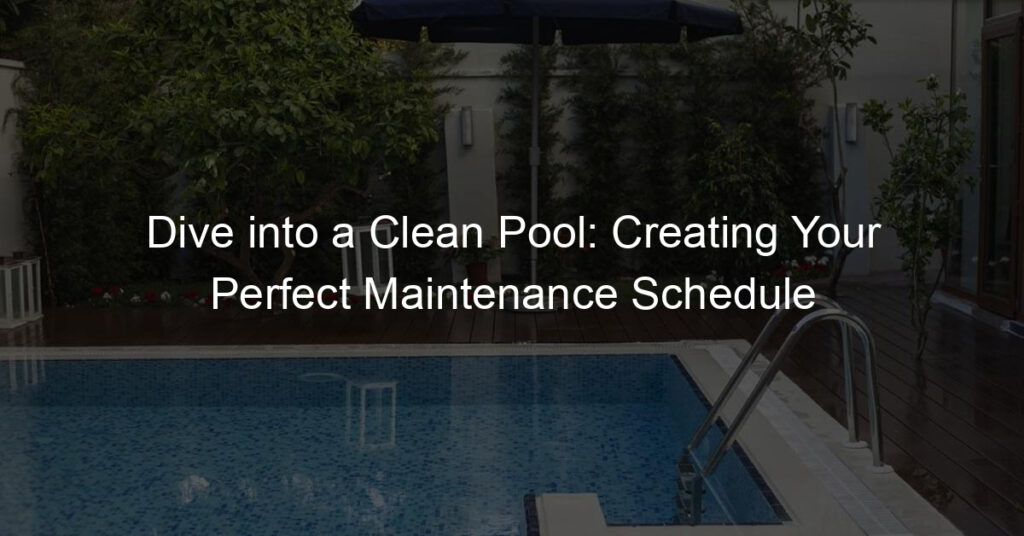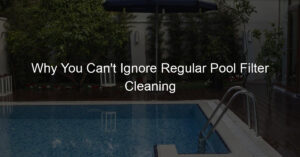Introduction to Pool Maintenance
Having a swimming pool can be a lot of fun, especially during the hot summer months. But it’s important to remember that owning a pool also comes with responsibilities. One of those responsibilities is pool maintenance. Let’s dive into why regular pool upkeep is so important and the benefits of having a clean swimming pool.
-
- Importance of Regular Pool Upkeep
Regular pool upkeep is crucial for several reasons. Firstly, it helps keep the pool’s water clean and safe for swimming. If a pool isn’t properly maintained, it can become a breeding ground for harmful bacteria and algae, which can cause health problems for swimmers. Secondly, regular maintenance can help prolong the life of your pool. It can prevent damage to the pool’s structure and equipment, saving you money in the long run.
-
- Benefits of a Clean Swimming Pool
There are many benefits to having a clean swimming pool. For one, it’s more enjoyable to swim in a clean pool. Nobody wants to swim in dirty, cloudy water. A clean pool is also safer. It reduces the risk of swimmers getting skin irritations or infections. Additionally, a clean pool is more visually appealing. It can enhance the overall look of your backyard and increase the value of your property.
In conclusion, regular pool maintenance is not just about keeping the water clean. It’s about ensuring the safety of the swimmers, prolonging the life of the pool, and enhancing the aesthetic appeal of your backyard. So, if you own a pool, make sure to keep it clean and well-maintained. It’s worth the effort!
Understanding Pool Maintenance
Pool maintenance is a crucial aspect of owning a swimming pool. It involves a series of tasks that ensure the pool remains clean, safe, and enjoyable. Let’s delve into some pool maintenance tips that can help you maintain your pool effectively.
Pool Maintenance Tips
There are two main ways to maintain your pool: Do-it-yourself (DIY) and professional pool maintenance. Both methods have their benefits and drawbacks, and the choice between the two often depends on your budget, time, and comfort level.
-
- DIY Pool Maintenance
DIY pool maintenance is a cost-effective way to keep your pool clean and safe. It involves tasks such as skimming debris off the pool surface, vacuuming the pool floor, testing and adjusting the water chemistry, and cleaning the pool filter. While this method can save you money, it requires a significant time investment and a basic understanding of pool care.
-
- Professional Pool Maintenance
Professional pool maintenance involves hiring a pool service company to take care of your pool. These professionals have the expertise and equipment to maintain your pool efficiently and effectively. While this method is more expensive than DIY, it can save you time and ensure that your pool is maintained to a high standard.
In conclusion, understanding pool maintenance is key to enjoying a clean and safe swimming pool. Whether you choose to do it yourself or hire a professional, regular pool maintenance is essential to prolong the life of your pool and ensure it remains a fun and healthy place to swim.
Creating a Pool Maintenance Schedule
Creating a pool maintenance schedule is crucial to keep your pool clean, safe, and enjoyable. It involves understanding your pool’s needs and developing a pool care schedule. Let’s dive into these steps:
-
- Understanding your pool’s needs
Every pool is unique and has different needs based on factors like size, location, usage, and the type of filtration system. For example, a pool that is frequently used may require more frequent cleaning and water testing. Similarly, a pool located under trees may need more frequent skimming to remove leaves and debris.
Understanding your pool’s needs also involves knowing the types of chemicals and equipment needed for its maintenance. For instance, you may need to use chlorine to keep the water clean and a pool vacuum for cleaning the pool floor.
-
- Developing a pool care schedule
Once you understand your pool’s needs, the next step is to develop a pool care schedule. This schedule should include daily, weekly, monthly, and seasonal tasks.
Daily tasks may include skimming the pool and checking the water level. Weekly tasks could involve testing the water’s chemical balance and cleaning the pool walls and floor. Monthly tasks might include checking the pool equipment and cleaning the filters. Seasonal tasks could involve opening the pool at the start of the swimming season and closing it when the season ends.
Creating a pool care schedule and sticking to it can help ensure your pool remains clean and safe for use. It can also help prevent costly repairs in the future.
Remember, pool maintenance is not a one-time task but a continuous process. So, make sure to regularly update your pool care schedule based on your pool’s changing needs.
Pool Cleaning Schedule
Keeping your pool clean and safe is a crucial part of pool ownership. A consistent cleaning schedule can help you avoid costly repairs and health issues. Here, we will discuss the weekly pool maintenance tasks that you should perform.
Weekly Pool Maintenance
Weekly maintenance is essential to keep your pool sparkling clean and inviting. It involves two main tasks:
-
- Checking Pool Chemistry
Regularly checking your pool’s chemistry is crucial to maintain a healthy swimming environment. You should test the water at least once a week to ensure the right balance of chemicals. This balance prevents the growth of bacteria and algae, which can make your pool unsafe for swimming.
-
- Cleaning Pool Filters
Cleaning your pool filters is another important weekly task. Dirty filters can reduce the efficiency of your pool’s circulation system and cause cloudy water. Make sure to clean your filters regularly to keep your pool water clear and clean.
By following these weekly maintenance tasks, you can ensure that your pool remains a safe and enjoyable place for everyone. Remember, a clean pool is a happy pool!
Seasonal Pool Maintenance
Just like your home, your pool also needs seasonal maintenance. This includes preparing your pool for the swimming season in spring and closing it for the winter. Let’s dive into these two important steps.
- Spring Opening
When the weather starts to warm up, it’s time to get your pool ready for the swimming season. Here are some steps to follow:
- Remove the Pool Cover: Start by removing and cleaning your pool cover. It’s important to clean it thoroughly to prevent algae growth.
- Check the Pool Equipment: Next, inspect your pool equipment. Check the pumps, filters, and heaters for any signs of damage.
- Balance the Water: Test your pool water and adjust the chemicals as needed. This includes the pH, alkalinity, and chlorine levels.
- Brush and Vacuum: Lastly, brush the sides of your pool and vacuum it to remove any debris.
- Winterizing Your Pool
As the weather gets colder, it’s time to prepare your pool for the winter. Here are some steps to follow:
- Balance the Water: Just like in spring, you need to balance your pool water. This time, you should also add a winterizing chemical kit to help protect your pool.
- Clean the Pool: Brush and vacuum your pool to remove any debris. This will help prevent algae growth during the winter.
- Lower the Water Level: Lower your pool water to below the skimmer line. This will help prevent damage from freezing water.
- Cover the Pool: Finally, cover your pool to protect it from the elements and keep it clean for the next season.
Remember, maintaining your pool is a year-round responsibility. By taking the time to properly open and close your pool, you can ensure it’s ready for you to enjoy every season.
Swimming Pool Maintenance Checklist
Keeping your swimming pool in top condition requires regular maintenance. This not only ensures that your pool remains clean and safe for use, but also extends its lifespan. Here is a simple checklist to guide you through the process.
-
- Equipment Checks
Regular equipment checks are crucial for maintaining the efficiency of your pool. This includes inspecting the pool pump, filter, heater, and other components. Ensure that they are working properly and look out for signs of wear and tear. For instance, if the pool pump is making unusual noises or the filter is not cleaning the water as it should, it may be time for a replacement.
-
- Water Balance Checks
Water balance is essential for the health and safety of those using the pool. It involves testing the pH, alkalinity, and chlorine levels of the water. The ideal pH level should be between 7.2 and 7.6, while the recommended chlorine level is 1.0 to 3.0 parts per million. Regular water balance checks can prevent issues such as algae growth and skin irritation.
-
- Cleaning and Maintenance Tasks
Cleaning tasks involve skimming the pool surface, vacuuming the pool floor, and brushing the pool walls and tiles. This helps to remove debris and prevent the buildup of algae and bacteria. Maintenance tasks include checking and adjusting the water level, cleaning the pool filter, and checking the pool cover for damage. It’s recommended to perform these tasks at least once a week.
By following this checklist, you can ensure that your swimming pool remains a clean, safe, and enjoyable place for everyone. Remember, regular maintenance is the key to a long-lasting pool.
Case Studies: Successful Pool Maintenance Schedules
Let’s dive into two real-life examples of successful pool maintenance schedules. These case studies will provide you with a clear understanding of how to maintain both residential and commercial pools effectively.
-
Case Study 1: Residential Pool
Meet Mr. Johnson, a homeowner in sunny California. He owns a medium-sized pool that he uses frequently during the summer. Here’s how he maintains his pool:
Task Frequency Skimming the pool’s surface Daily Vacuuming the pool Weekly Checking water chemistry Twice a week Backwashing the filter Monthly By sticking to this schedule, Mr. Johnson ensures his pool stays clean, safe, and ready for use at all times.
-
Case Study 2: Commercial Pool
Now, let’s look at a commercial pool at the Sunny Days Hotel. With a larger pool and more swimmers, their maintenance schedule is a bit more intensive:
Task Frequency Skimming the pool’s surface Several times a day Vacuuming the pool Daily Checking water chemistry Daily Backwashing the filter Weekly By adhering to this rigorous schedule, the Sunny Days Hotel ensures their pool remains sparkling clean and safe for their guests.
These case studies highlight the importance of a regular maintenance schedule for both residential and commercial pools. By following a similar schedule, you too can enjoy a clean and safe swimming environment.
Conclusion: Enjoying Your Clean Pool
After all the hard work and dedication, you can finally enjoy your clean and sparkling pool. But before we wrap up, let’s take a moment to review the benefits of regular maintenance and some final tips for pool care.
- Benefits of Regular Maintenance
Regular pool maintenance is like brushing your teeth. You do it consistently to prevent bigger problems down the line. Here are some benefits:
- It keeps your pool clean and safe for everyone to enjoy.
- It helps you spot minor issues before they become costly repairs.
- It extends the lifespan of your pool equipment.
- It maintains the value of your pool and your property as a whole.
- Final Tips for Pool Care
Now that you understand the importance of regular maintenance, here are some final tips to keep your pool in top shape:
- Stick to your cleaning schedule. Consistency is key in pool maintenance.
- Don’t ignore the pH levels. Keeping them balanced ensures a healthy swimming environment.
- Keep an eye on the water level. Too much or too little can cause problems.
- Don’t forget to winterize your pool if you live in a colder climate.
In conclusion, maintaining a clean pool is not just about aesthetics. It’s about safety, longevity, and value. So, take a deep breath, dive in, and enjoy the fruits of your labor. You’ve earned it!














